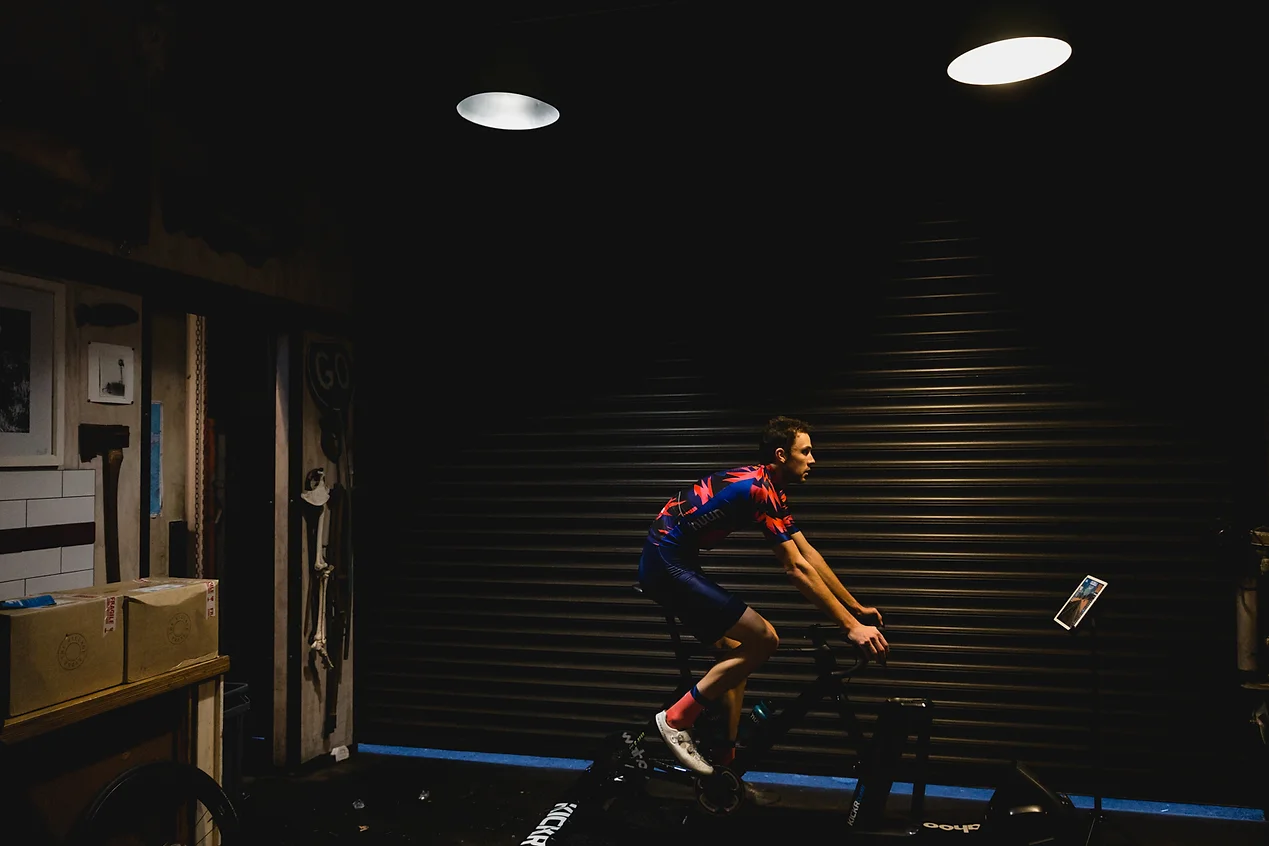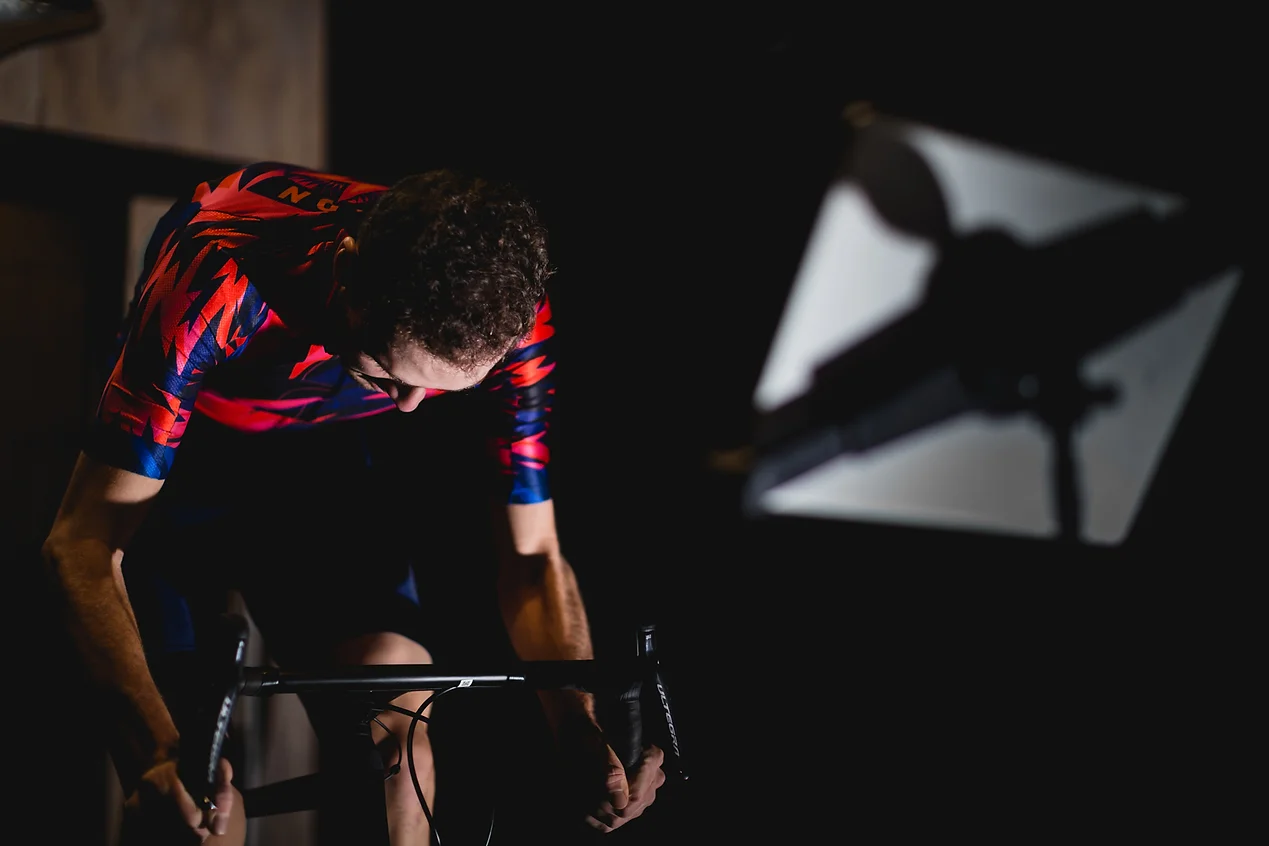Words: Selwyn Parker (European Correspondent)
Images: Cameron Mackenzie
Never before in human history have so many cyclists spent so many hours pedalling to nowhere during the pandemic. They might all be going nowhere fast but indoor cycling is far from pointless. (After all, in a velodrome you just go round and round.)
A lot of money is being raised, like the £15,000 that non-cyclist Londoner Jacob Hill-Gowing collected for charity by riding his own version of the Tour de France on an early model indoor cycling machine that you would find in a tip these days. With no cycling background, Hill-Gowing covered 3,500kms over 41 days in a one-bedroom flat. Tour de France legend Geraint Thomas chipped in with some advice when the big-hearted Londoner got a sore bottom – ‘Go buy yourself some bike shorts’.
In the meantime, the pros are demonstrating the mental as well as physical endurance you need to ride the grand tours. Thomas rattled off three mammoth 12-hour Zwift-motivated sessions on his turbo trainer on consecutive days, the idea being to replicate the length of the shifts of front-line healthcare staff managing the pandemic. All up, he raised £360,000.
In another fundraiser the legendary sprinter Mark Cavendish from Bahrein-McLaren and Ineos’ Luke Rowe completed Zwift’s Everest challenge which required them to ride 8,848 metres uphill, a feat that took more than 10 ½ hours. “It was grim,” commented Cavendish, no stranger to suffering.

For good measure Trek-Segafredo’s Guilio Ciccone, the best climber in the last Giro, went straight past the summit, climbing 10,397 metres in a 254km-long, 11-hour indoor ride that burnt up 9,000 calories and shed two kilos off him. “I was completely cooked, drained,” he told Gazetta dello Sport.
It’s an ill wind that doesn’t blow some good. Britain’s big retailers report a jump in indoor cycling equipment while BikeBiz, an industry newsletter, cites a whopping 440 per cent week-on-week increase in orders for turbo trainers and static bikes.
There’s a simultaneous rise in technology that eases the boredom. A virtual reality fitness company called VirZOOM posted a 45 per cent increase in usage of its VZfit workout since the 1st March and promptly ran out of stock.
Having been humiliated too often on Zwift – I once got buried by a Dutch woman pushing 450 watts to my 150, I’m trying out BigRingVR (for virtual reality), an American system whose library boasts 350 different rides in 11 countries including the obligatory Alpe d’Huez and Mont Ventoux.

And so, it looks like the great tour indoor is coming to an end. France let the pros off the leash from 11th May provided they ride alone and not in Paris and other big cities. That should give them time enough to get into top shape for when the professional calendar kicks off on 1 August with the Strade Bianche and, surprisingly, one of the spring classics – the 300km Milan-San Remo – a week later. The rest of these one-day races are packed into a three-week period in October.
It’s happening in the nick of time. The last road races anywhere took place on 3rd March and the number of outright cancellations in Europe has been piling up. Roughly half the races originally scheduled for June have been cancelled, including the Tour of Switzerland, rather than postponed.
Unveiled on 5th May, the new schedule is built around the Tour de France as the biggest drawcard. The Criterium du Dauphine, a warm-up to the tour, has been cut from eight to five days, starting 12 August, but with the big climbs retained. The tour starts on 29 August, the Giro on 4 October and a shorted Vuelta on 20 October.
But the calendar should be workable, according to Christian Prudhomme, boss of the Tour de France, told L’Equipe. “I’m pleased that cycling spoke with one voice to create a calendar over a three and a half month period. [It’s] an exceptional calendar built in an exceptional situation. We hope it will be the light at the end of the tunnel even though we’ve got to remember that we’ve all got to live with this pandemic.”
Competition can’t come soon enough for the pro teams. “If we don’t race this year, I’ll no longer have a team,” the manager of Deceunink-Quick Step Patrick Lefevere told Spain’s Sporza television, but also expressing his gratitude for the UCI’s calendar even if has been cobbled together in extremis. “I’m known as the most critical person on the cycling world but I will not complain about the calendar. In the current circumstances we should be humble and pray that we can still race this year.”
If there was no racing however and it’s by no means certain the calendar will survive a second round of Covid 19, Lefevere, an accountant who can do the sums, estimates that half of the teams will collapse including his own. “If there is no racing any more, many cycling teams will die.”

